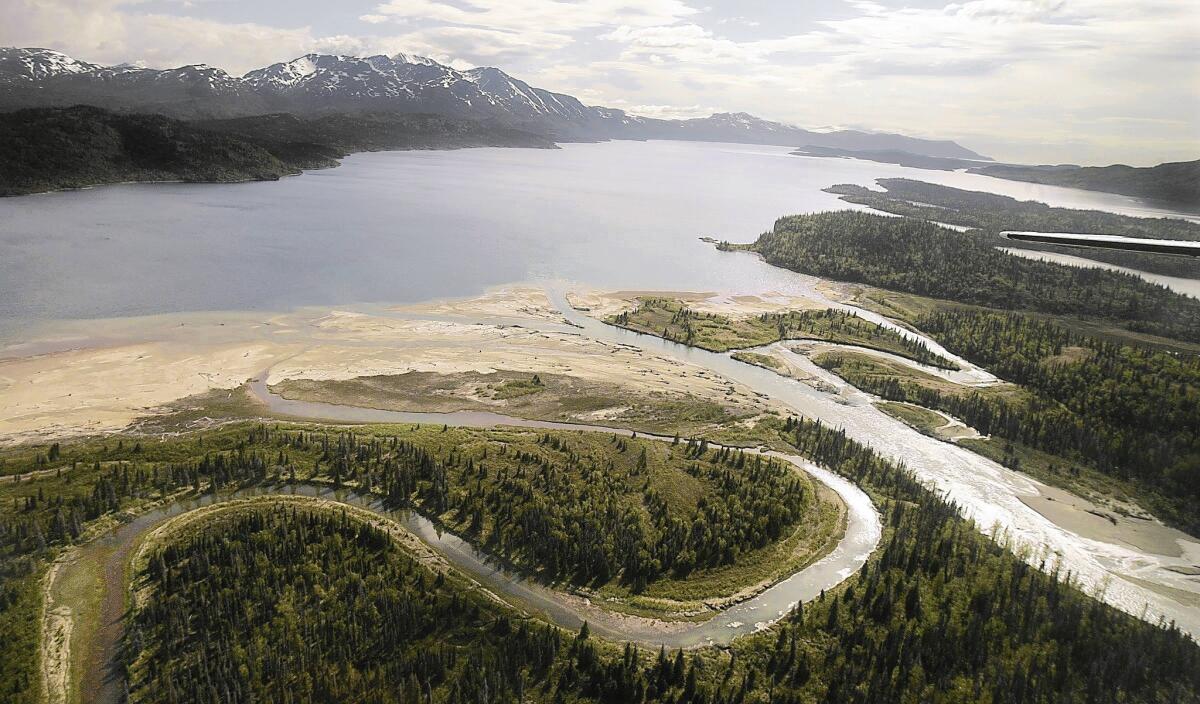EPA urges protection for Bristol Bay, putting new Alaska mine at risk

- Share via
SEATTLE — The Environmental Protection Agency took the first step Friday toward possibly halting construction of the largest open-pit mine in North America, declaring that Alaska’s Bristol Bay — home to the most productive sockeye salmon fishery on Earth — must be protected.
“Extensive scientific study has given us ample reason to believe that the Pebble Mine would likely have significant and irreversible negative impacts on the Bristol Bay watershed and its abundant salmon fisheries,” EPA Administrator Gina McCarthy told reporters Friday morning.
“This process is not something the agency does very often,” McCarthy said in announcing her agency’s decision to use the power granted to it under the Clean Water Act. “But Bristol Bay is an extraordinary and unique resource.”
Conservation, fishing and Alaska Native groups hailed the decision, which could potentially stop Pebble Mine. They say the EPA’s action is a victory for the crucial ecosystem, for Natives who depend on the salmon fishery for survival, and for the commercial and recreational fishing industries.
Chris Wood, president of Trout Unlimited, said in a written statement that “it is difficult to overstate the significance” of the EPA announcement. “If the EPA follows the science and follows through on this, it will rank as one of the most significant conservation achievements of the past 50 years.”
But Tom Collier, chief executive of the Pebble Limited Partnership, said that his company would fight the EPA and prevail. He said in an interview Friday that the agency’s scientific assessment process was “maneuvered” to achieve a predetermined negative result and that the entire process was flawed.
“I think we’ll drive a stake through this notion that there ought to either be a veto or restrictions placed on this project before we even file our application for a permit,” Collier said. “We don’t think they have the authority to do a veto before a permit has been filed.”
Pebble Mine is a potential source of gold, copper and molybdenum, but the low-grade deposits are located at the headwaters of the Bristol Bay fishery and next to a national park. The fishery supplies nearly half of the world’s supply of wild sockeye salmon. A University of Alaska Anchorage study said that the multiplier effect of harvesting, processing and retailing Bristol Bay salmon is worth $1.5 billion across the United States.
In 2010, tribes and others in Bristol Bay — a wild region about the size of Ohio with more brown bears than people — asked the EPA to protect the watershed. But the agency said it first needed to study the potential effects of the proposed mine. The agency announced the results of that study in January.
The EPA received more than a million comments during the process and came to understand, McCarthy said, that “the Bristol Bay watershed is indeed one of the most productive ecosystems on the planet. We learned what makes that ecosystem tick and why it is the most prolific salmon factory in the world.”
The agency decided, she continued, to begin what is expected to be a yearlong process of investigation and public hearings that could lead to halting the controversial mine.
In the Clean Water Act’s 42 years of existence, McCarthy said, her agency has initiated this process only 29 times and issued restrictions only 13 times.
Using section 404(c) of the Clean Water Act “is not something — and I want to stress this — that the agency does very often,” she said. “But the Bristol Bay fishery is an extraordinary resource, and it’s worthy of out-of-the-ordinary agency actions to protect it.”
Whether to allow the mine and its promise of jobs to go forward has been a fraught proposition even for Alaska Republicans, because it pits three of the state’s biggest industries — fishing, mining and tourism — squarely against each other in a region that has long bristled under federal intervention.
“Today’s egregious action by the EPA goes beyond federal overreach. It is unprecedented,” a spokeswoman for GOP Gov. Sean Parnell said in a statement. “The EPA has not only cut off public input and process, but has also unilaterally decided that they, not Alaskans, know what’s best for our future.”
“The state is prepared to pursue all legal options to ensure Alaska’s rights are protected,” Sharon Leighow added.
Rep. Don Young (R-Alaska) called the EPA’s decision an “expansive, jurisdictional power grab” and said that Friday’s announcement showed “an agency corrupted by politics, one with no regard for the state or federal permitting processes found in statute.”
“Instead, the EPA seeks to broaden its reach until their tentacles encumber every aspect of American life,” he said.
Democratic state Rep. Les Gara of Anchorage said he welcomed the EPA’s action but blamed the governor for not taking action against the Canadian-owned project.
“Having the EPA come in to do the state’s work to protect our fishing streams was not my first choice. But the governor refused to take the action to stand up for Alaskans in Bristol Bay and the majority of Alaskans who value our fishing waters,” Gara said. “Were I in his place, I would not have sided with foreign mine owners who seek to jeopardize the world’s greatest wild salmon and trout waters.”
Alaska’s U.S. Sen. Mark Begich, a Democrat, gave the EPA’s decision a mixed grade.
He called Pebble “the wrong mine in the wrong place,” but said in a written statement Friday that he was “skeptical of federal overreach from an administration that has already demonstrated it does not understand Alaska’s unique needs.”
More to Read
Sign up for Essential California
The most important California stories and recommendations in your inbox every morning.
You may occasionally receive promotional content from the Los Angeles Times.














